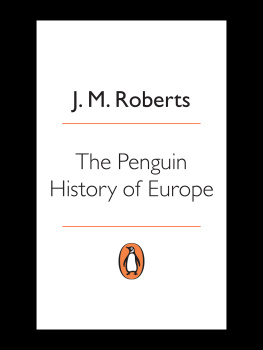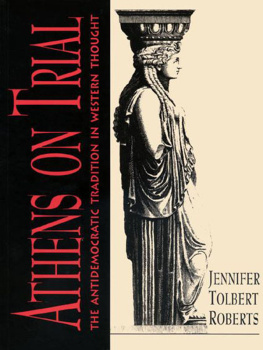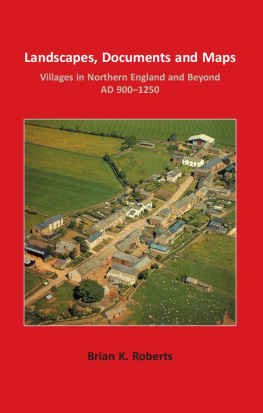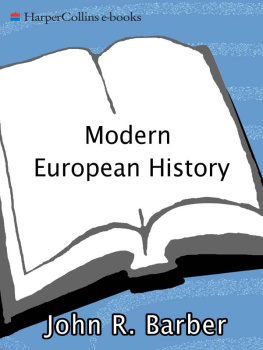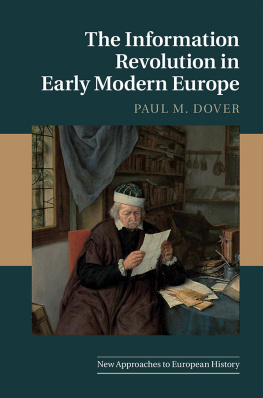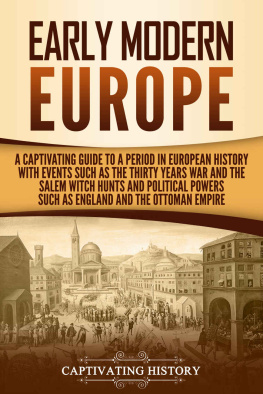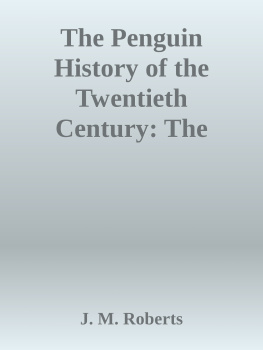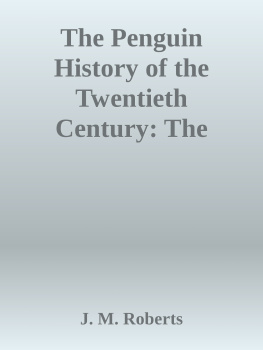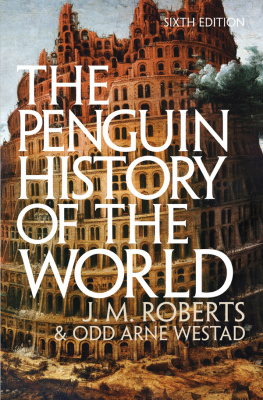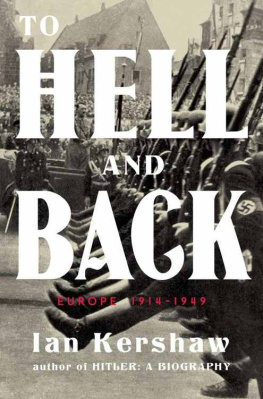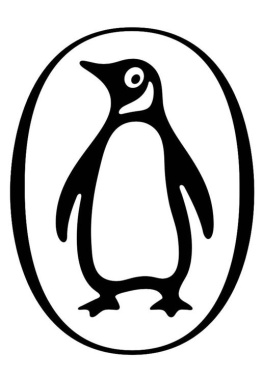Roberts - The Penguin History of Europe
Here you can read online Roberts - The Penguin History of Europe full text of the book (entire story) in english for free. Download pdf and epub, get meaning, cover and reviews about this ebook. year: 2008, publisher: Penguin Books Ltd, genre: History. Description of the work, (preface) as well as reviews are available. Best literature library LitArk.com created for fans of good reading and offers a wide selection of genres:
Romance novel
Science fiction
Adventure
Detective
Science
History
Home and family
Prose
Art
Politics
Computer
Non-fiction
Religion
Business
Children
Humor
Choose a favorite category and find really read worthwhile books. Enjoy immersion in the world of imagination, feel the emotions of the characters or learn something new for yourself, make an fascinating discovery.
The Penguin History of Europe: summary, description and annotation
We offer to read an annotation, description, summary or preface (depends on what the author of the book "The Penguin History of Europe" wrote himself). If you haven't found the necessary information about the book — write in the comments, we will try to find it.
Comprehensive in its scope and brilliantly readable, this is a superb follow-up to the authors bestselling Penguin History of the World. Beginning with prehistory and the early civilizations of the Aegean, The Penguin History of Europe traces the development of European identity in its many guises, through the age of Christendom, the Middle Ages, early Modern history and the old European order.
The Penguin History of Europe — read online for free the complete book (whole text) full work
Below is the text of the book, divided by pages. System saving the place of the last page read, allows you to conveniently read the book "The Penguin History of Europe" online for free, without having to search again every time where you left off. Put a bookmark, and you can go to the page where you finished reading at any time.
Font size:
Interval:
Bookmark:
PENGUIN BOOKS
THE PENGUIN HISTORY OF EUROPE
J. M. Roberts was born in Bath and educated at Taunton School and Keble College, Oxford. After National Service he returned to Oxford in 1950 and became a Fellow of Magdalen the following year. In 1953 he went to the United States as Commonwealth Fund Fellow, the first of several visits to America during which he held, among other posts, those of Member of the Institute for Advanced Study, Princeton (1960), and visiting professorships at the University of South Carolina and Columbia University, New York. He was a Fellow and Tutor of Merton College, Oxford, from 1953 to 1979. From 1979 to 1985 he was Vice-Chancellor of Southampton University. He then returned to the Wardenship of Merton in 1985, from which he retired in 1994. In 1996 he was appointed CBE for services to education and history.
Dr Roberts edited the popular and successful partwork publication Pur-nell's History of the Twentieth Century. From 1967 to 1976 he was joint editor of the English Historical Review. He is the author of Europe 1880-1945, The Mythology of the Secret Societies, The Paris Commune from the Right, The Age of Revolution and Improvement and The French Revolution. In 1985 BBC2 transmitted the thirteen-part historical series The Triumph of the West, which Dr Roberts wrote and presented, and later in the year he published his book of the same title. He was historical adviser to the successful recent BBC television series People's Century.
Dr Roberts was also the author of The Penguin History of the World and The Penguin History of the Twentieth Century. Dr Roberts died in May 2003.
J. M. ROBERTS


PENGUIN BOOKS
Published by the Penguin Group
Penguin Books Ltd, 80 Strand, London WC2R 0RL, England
Penguin Putnam Inc., 375 Hudson Street, New York, New York 10014, USA
Penguin Books Australia Ltd, 250 Camberwell Road, Camberwell, Victoria 3124, Australia
Penguin Books Canada Ltd, 10 Alcorn Avenue, Toronto, Ontario, Canada M4V 3B2
Penguin Books India (P) Ltd, 11 Community Centre, Panchsheel Park, New Delhi 110 017, India
Penguin Books (NZ) Ltd, Cnr Rosedale and Airborne Roads, Albany, Auckland, New Zealand
Penguin Books (South Africa) (Pty) Ltd, 24 Sturdee Avenue, Rosebank 2196, South Africa
Penguin Books Ltd, Registered Offices: 80 Strand, London WC2R 0RL, England
www.penguin.com
First published in Great Britain by Helicon Publishing Ltd 1996
Published in Penguin Books 1997
Copyright J. M. Roberts, 1996
Maps and chronologies copyright Helicon Publishing Ltd,1996
All rights reserved
The moral right of the author has been asserted
978-0-14-192509-7

Let the conversation begin...
Follow the Penguin Twitter.com@penguinUKbooks
Keep up-to-date with all our stories YouTube.com/penguinbooks
Pin Penguin Books to your Pinterest
Like Penguin Books on Facebook.com/penguinbooks
Listen to Penguin at SoundCloud.com/penguin-books
Find out more about the author and
discover more stories like this at Penguin.co.uk
My intention in this book is to provide an outline of the history lying behind Europe. My starting-point was what I said about Europe several years ago in my History of the World, and the structure of this book reflects that. Sometimes I have repeated here things I said in that earlier book; when I have not changed my mind about a particular topic and have felt no need to give it more or less attention, I have not hesitated to repeat myself. When my words still strike me as the right ones there seems to be no point in striving for elegant variation. But anyone who has read that book will find in this one much that is new and a different perspective.
My wish has been to write a serviceable guide. Europe is nowadays a very political word, and I did not wish to usurp the role of the politician. Nothing which follows is intended to promote any particular response to the word except one: caution about its meaning. We still do not easily agree even on who are Europeans or (if we think we can answer that question) what it is that they share. The answer must always be different things at different times and such questions demand historical answers. History settled much of the way most Europeans see themselves (though they may not know it), and it is worthwhile to try to discern what it was that left many of them with a sense of shared experience.
It may now be more than ever desirable to try to make sense of the past and measure its present weight. Recent events have shown how we are only too often taken aback by the history erupting (or re-erupting) around us. The past is always lying in ambush as Ireland shows only too well. It should not be necessary to point that out, but history now gets less attention in the family and at school than was once the case, and that makes us more vulnerable than in the past. Only a few months ago I read in my newspaper that there are now officers of the Royal Air Force who do not know what the Battle of Britain was. More tragically and bloodily, forgotten history has just helped to give Bosnia five years of misery.
My immediate stimulus to write was an invitation from my publisher, David Attwooll. He must not be thought responsible except in the most formal sense for the selective and personal view set out here, but I am grateful for the opportunity he gave me. Some may think what follows a demonstration of the obstacles to understanding the past implicit in any attempt to tell a story. To describe the past is always to oversimplify it and general history above all is open to adverse criticism on this count. That this is very much a general history will be obvious. Even the last two of the six highly condensed Books which are the sub-divisions of my text, and which move at a slightly more leisurely pace than their predecessors, have each to cover half a century or so. Some readers are bound to be disappointed when they find important topics have been excluded. In three hundred thousand words there is not room for very much of a continent's history.
Sometimes I have tried to condense information in numbers, but I do not want to claim too much for them. Except in very specific instances, historical statistics should be illustrative and indicative rather than grounds for nice calculation. They should not be given too much credence. Even the best are often only close approximations, whose usefulness varies with the uses to which they are put. I have tried to follow trustworthy authorities, but even they have often had to work with imperfect data. Scientists ten years after the event still dispute the number of deaths attributable to the Chernobyl disaster. At a very different level, for all the richness of the statistical material provided so generously by all sorts of authorities (the CIA felt able to say that in July 1991 the population of India was not 850 or even 866 million but exactly 866,351,738!) we would be unwise to reckon that we know within 50 million or so how many human beings are at present alive on earth. The further we go back, too, the shakier, usually, are the sources. The best I can hope to have done is to have used considered estimates to indicate meaningful orders of magnitude and relevant comparisons.
Next pageFont size:
Interval:
Bookmark:
Similar books «The Penguin History of Europe»
Look at similar books to The Penguin History of Europe. We have selected literature similar in name and meaning in the hope of providing readers with more options to find new, interesting, not yet read works.
Discussion, reviews of the book The Penguin History of Europe and just readers' own opinions. Leave your comments, write what you think about the work, its meaning or the main characters. Specify what exactly you liked and what you didn't like, and why you think so.

